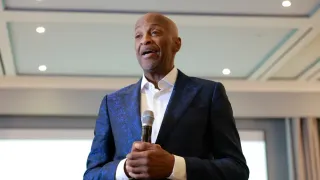May 9, 2025
Will Pope Leo XIV Reflect the Progressive Stance of Pope Francis on LGBTQ+ Issues?
READ TIME: 4 MIN.
One of the ongoing debates within the Catholic Church is its position on LGBTQ+ issues. The late Pope Francis made headlines when he appeared to push the Church "for his openness to members of the L.G.B.T.Q. community, his support for those who provided them with ministry and spiritual guidance, and for the ways in which he changed the church's tone – if not always its doctrine – on issues of gender and sexuality," according to the New York Times.
But where the American-born Pope Leo XIV stands is an open question that has divided the queer community within the Church. Some are citing statements he has made in the past that would squarely put him on the conservative side, while others say to give him a chance and allow him to formulate his stance.
Not that much is known. As the Times points out, "Pope Leo has spent most of his career in rural Peru and has never drawn wide attention for his positions on those issues. But reports that he had made scattered comments in the past that were critical of gay and transgender people had left some in the L.G.B.T.Q. community nervously reading the tea leaves on Thursday."
Nonetheless, remarks made by Father Robert Prevost, the new Pope Leo XIV, more than a decade ago are being seen as a red flag on his position on queer issues.
The Guardian reports that in a 2012 address to the world synod of bishops, the man who now leads the church said that "Western mass media is extraordinarily effective in fostering within the general public enormous sympathy for beliefs and practices that are at odds with the Gospel – for example abortion, homosexual lifestyle, euthanasia".
In the remarks, of which he also read portions for a video produced by the Catholic News Service, a news agency owned by the United States Conference of Catholic Bishops, the cleric blamed mass media for fostering so much "sympathy for anti-Christian lifestyles choices" that "when people hear the Christian message it often inevitably seems ideological and emotionally cruel".
The first video is comprised of Prevost speaking against an array of pop culture images that portray those sympathies and beliefs at odds with the Gospel, including scenes from "The New Normal" and "Modern Family," both cited as a sympathetic views of same-sex parenting. In his text, he says when compared with these portrayals, the ideology of the Church seems out-of-date and harsh.
While the Church says that homosexuals should be treated with dignity and not be discriminated against, it opposes same-sex unions and advises chastity when dealing with homosexual desire. The Church's official stance was expressed in the 1986 "On the Pastoral Care of Homosexual Persons" (written by Cardinal Joseph Ratzinger, who later became Pope Benedict XIV) in which he wrote homosexuality is "more or less strong tendency ordered toward an intrinsic moral evil." Homosexual acts were described as "intrinsically disordered" because they are "closed to the gift of life" and do not proceed from a "genuine affective and sexual complementarity." He also said that while homosexuals must be treated with respect, compassion, and sensitivity, Ratzinger warned against treating homosexuality as morally neutral or promoting its acceptance in society."
These sentiments appear to underscore Prevost's comments as seen in the videos, in which his biggest complaint isn't that the Church is wrong in its views, but has allowed to the secular media to get the upper-hand in humanizing these social issues.
He complained: "Alternative families comprised of same-sex partners and their adopted children are so benignly and sympathetically portrayed in television programs and cinema today."
In the second video, Prevost cites examples, dating back to Roman times, of how the Church countered secular criticism by an emphasis on the "mystery" of the church.
Nonetheless, some Catholics, such as Francis DeBernardo, the executive director of New Ways Ministry, a Maryland-based LGBTQ+ Catholic group, expressed to the Times an optimism that in the years since making the speech, Prevost's views have changed.
"We pray that in the 13 years that have passed, 12 of which were under the papacy of Pope Francis, that his heart and mind have developed more progressively on LGBTQ+ issues, and we will take a wait-and-see attitude to see if that has happened. We pray that as our church transitions from 12 years of an historic papacy, Pope Leo XIV will continue the welcome and outreach to LGBTQ+ people which Pope Francis inaugurated."
DignityUSA, a group that represents LGBTQ+ Catholics, were a bit more cautious, saying in a statement "We note that this statement was made during the papacy of Benedict XVI, when doctrinal adherence appeared to be expected. In addition, the voices of LGBTQ+ people were rarely heard at that level of church leadership. We pray that Pope Leo XIV will demonstrate a willingness to listen and grow as he begins his new role as the leader of the global church."
It was in 2013, a year after Prevost made these remarks, that Pope Francis famously said in regards to there being a gay lobby in the Vatican: "I have yet to find someone who introduces himself at the Vatican with an identity card marked 'gay'," the pope joked. "But we must distinguish the fact that a person is gay from the fact of lobbying, because no lobbies are good.
"If a person is gay," he added, "and he searches for the Lord and has goodwill, who am I to judge?"
"The healing that began with 'Who am I to judge?' needs to continue and grow to 'Who am I, if not a friend to LGBTQ+ people?'" DeBernardo said.
"Pope Francis opened the door to a new approach to LGBTQ+ people; Pope Leo must now guide the church through that door," he added. "Many Catholics, including bishops and other leaders, remain ignorant about the reality of LGBTQ+ lives, including the marginalization, discrimination and violence that many still face, even in Catholic institutions. We hope that he will further educate himself by meeting with and listening to LGBTQ+ Catholics and their supporters."
Watch the videos below in which Prevost speaks in his own words in regards to the Church's stances being at odds with secular culture. That he looks back centuries for ways for the Church to counter its unpopular public stance on such issues, should give those supporting him some concern that he's going to be progressive on doctrine.






